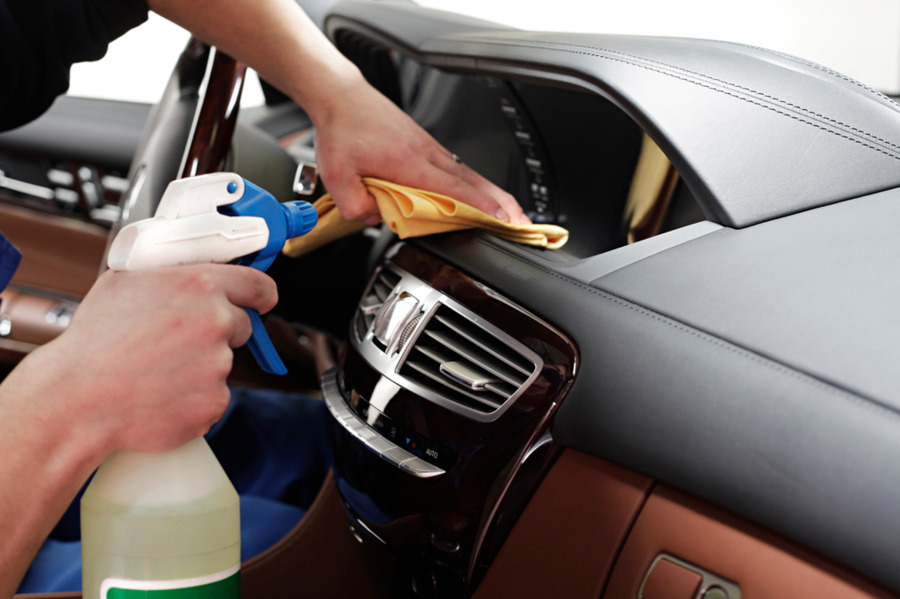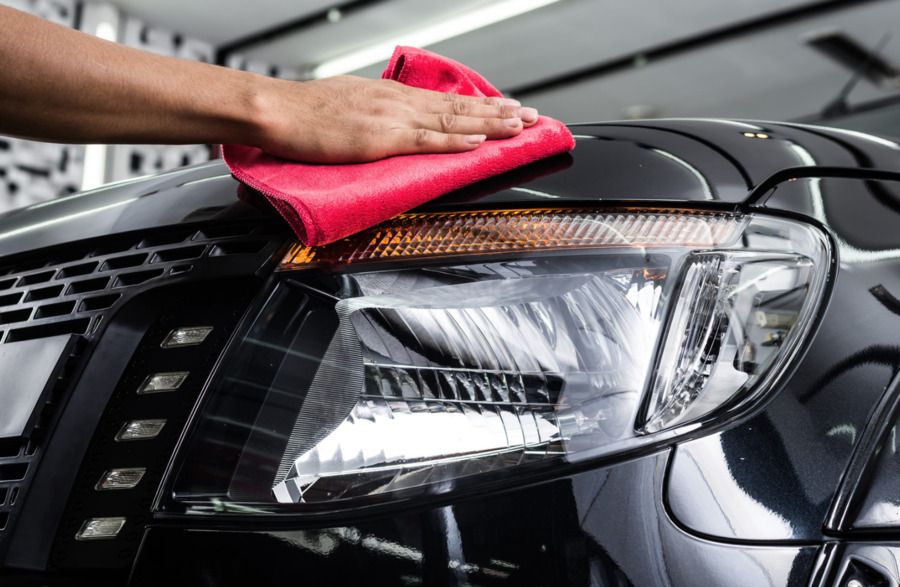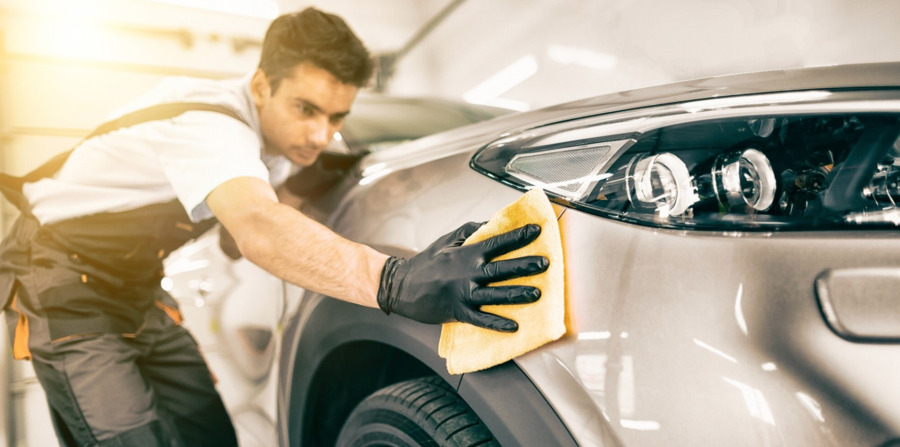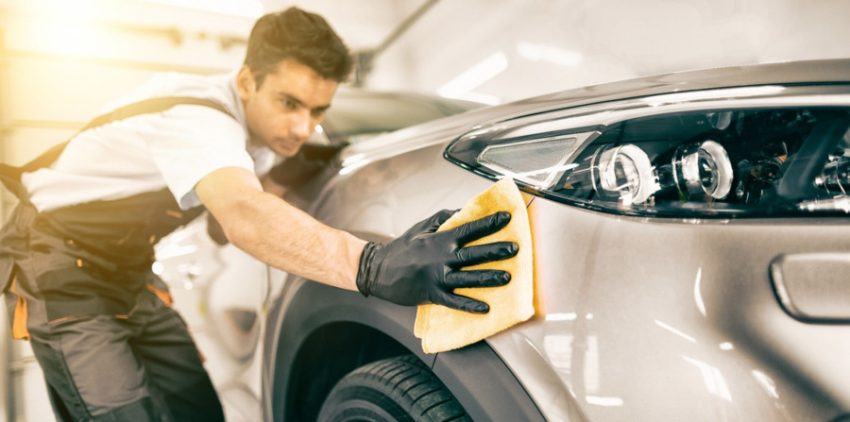Auto detailing is a specialized process that involves the thorough cleaning, restoration, and finishing of a vehicle inside and out to produce a high-quality level of cleanliness and polish. The history of car detailing services dates back to the early 19th century when horse-drawn carriages were polished and maintained meticulously. As automobiles became more common in the 20th century, the need to keep these valuable assets grew, leading to the professionalization of car care.
Initially, auto detailing was a basic service primarily focusing on cleaning the exterior with soap and water and waxing to make it shine. Over time, the methods and products used in car detailing services have evolved significantly. Today, detailing includes various services aimed at extending the life of the vehicle’s paint, including claying, polishing, and applying sealants and ceramic coatings.
The importance of car detailing services cannot be overstated. Regular detailing not only maintains the vehicle’s appearance but also acts as a shield, helping to uphold its value and appeal. More than just aesthetic enhancement, detailed cleaning prevents contaminants like dirt, dust, and chemical pollutants from degrading both the interior and exterior of the vehicle. On the exterior, proper detailing can protect against the sun’s harmful ultraviolet rays that cause fading and oxidation to car paint. Inside the vehicle, detailing helps maintain the integrity and functionality of interior components, ensuring a pleasant and healthy environment for passengers.
Overall, car detailing services play a crucial role not only in maintaining the aesthetic appeal of vehicles but also in preserving their longevity, ensuring that they remain in pristine condition for years. This meticulous care is not just for car enthusiasts or everyday commuters, but for anyone who values their vehicle as an investment and wants to ensure its long-term value.

Advancements in Chemical Technologies
Ceramic Coatings
Ceramic coatings are a cutting-edge advancement in car detailing services. They involve applying a liquid polymer that chemically bonds with the vehicle’s factory paint to create a layer of protection. This polymer is made from silica and other chemical compounds that form a clear, hard coating when cured. Unlike traditional waxes that sit on top of the vehicle’s paint, ceramic coatings bond on a molecular level, providing a more durable and long-lasting shield.
How Ceramic Coatings Work?
The application of ceramic coatings involves a meticulous process. The vehicle’s surface must be thoroughly cleaned and prepared, and imperfections such as swirls or scratches are polished out to ensure a perfectly smooth surface. Once the vehicle is prepared, the ceramic coating is carefully applied in a controlled environment to ensure even coverage. The coating then cures and bonds to the paint, creating a permanent protective layer.
Benefits Over Traditional Wax
The benefits of ceramic coatings over traditional wax are significant:
- Durability: While traditional wax might last a few months, ceramic coatings can protect the vehicle for several years. Some high-quality coatings promise durability for up to 5 years before requiring reapplication.
- Protection from UV Rays: Ceramic coatings provide excellent protection against the fading and oxidation caused by the sun’s UV rays, which is especially valuable in regions with intense sunlight.
- Chemical Resistance: These coatings also resist chemical stains and etching better than waxes, protecting against acidic contaminants like bird droppings, bug splatter, and tree sap that can etch into the paint.
- Enhanced Gloss: Ceramic coatings add a deep, rich gloss to the vehicle’s paint, significantly improving its color and finish.
Ceramic coatings are especially popular in the UAE, where the intense sun and desert conditions can be particularly harsh on vehicle exteriors. Services can range based on the quality of the coating and the size and type of the vehicle:
- A basic ceramic coating package for a compact car like a Toyota Corolla might start around AED 1,500.
- For a more comprehensive coating application on mid-range cars such as the Honda Accord or Ford Fusion, the cost might be about AED 2,000 to AED 2,500.
- Luxury cars like a Mercedes-Benz C-Class or BMW 5 Series could see prices ranging from AED 3,000 to AED 5,000, reflecting the premium materials and extra care involved.
Polymer Sealants
Polymer sealants represent a significant advancement in auto detailing services. They utilize evolved chemical formulations to provide superior protection for vehicle exteriors. Initially, car sealants were simple formulations that offered basic protection against moisture and dirt. Over the years, polymer technology has enhanced these products to protect and enhance the vehicle’s paint job.
Modern polymer sealants are synthetic polymers that cross-link on a molecular level when applied to the car’s car’s surface. This cross-linking process creates a much denser and more durable barrier than older sealants could provide. As technology has progressed, these polymers have been engineered to bond more effectively with the paint’s surface, resulting in a longer-lasting and more effective seal.
The Science Behind Polymer Sealants
Polymer sealants work by forming a chemical bond with the car’s paint. Once applied, the sealant begins a curing process in which its molecules align and bind to create a solid, protective layer over the paint. This layer is highly resistant to environmental pollutants, moisture, and UV radiation, providing a substantial shield that maintains the integrity of the paint beneath.
The effectiveness of polymer sealants comes from their ability to fill in the pores and irregularities on the paint surface, creating a smooth, slick layer that enhances gloss and color depth while protecting against contaminants. Unlike waxes on top of the paint, polymer sealants integrate with the paint, providing a stronger and more durable protective barrier.
Benefits Over Older Sealants
- Durability: Polymer sealants can last anywhere from six months to a year, significantly longer than traditional wax.
- Protection: They offer excellent protection against UV rays, reducing oxidation and fading of the car paint.
- Chemical Resistance: These sealants are highly resistant to acids, alkalis, and other environmental pollutants that can damage car paint.
- Aesthetic Improvement: Polymer sealants’ smooth finish enhances the vehicle’s shine and color depth, improving its overall appearance.
In Dubai and across the UAE, the cost of applying polymer sealants can vary depending on the brand of sealant used, the size of the vehicle, and the detailing service provider. Typical costs might look like:
- Small cars such as a Volkswagen Golf or Nissan Sentra could be around AED 700 to AED 1,000.
- Larger vehicles like a Toyota Land Cruiser or Ford Explorer, which require more product and labor, might range from AED 1,200 to AED 1,800.
- Prices for high-end luxury or sports cars, such as a Porsche 911 or Audi A8, can range from AED 2,000 to AED 3,000, reflecting the premium care and materials used.

Technological Innovations in Detailing Equipment
Laser-Guided Polishing Tools
Laser-guided polishing tools represent a cutting-edge advancement in auto detailing technology. These tools incorporate laser systems that help assess the paint’s condition and ensure an even application of polish. The lasers guide the operator to apply the polish uniformly across the surface, detecting any imperfections or unevenness in the paintwork that might need additional attention.
Advantages of Precision Work
- Accuracy: Lasers allow for extremely precise control over the polishing process, ensuring that no area is over-polished or under-polished.
- Consistency: Each vehicle section is treated with the same pressure and exposure, leading to a uniformly smooth surface.
- Efficiency: Reduces the time required for the polishing process, as the laser guidance speeds up the assessment and correction phases.
Comparison with Traditional Methods: Traditional hand polishing relies heavily on the technician’s skill and experience, which can lead to inconsistencies in the finish. Orbital buffers offer a more uniform application than hand polishing but still lack the precision of laser-guided tools. These traditional methods also pose a higher risk of burning through the paint if too much pressure is applied or an area is worked on for too long. Laser-guided tools minimize these risks, making them superior in both safety and finish quality.
High-Pressure Steam Cleaners
High-pressure steam cleaners have become a staple in modern auto detailing for interior and exterior cleaning. These devices use steam to lift dirt and grime from the vehicle’s surfaces without harsh chemicals.
Environmental and Efficiency Benefits
- Reduced Water Usage: Steam cleaners use significantly less water than traditional washing methods. A typical steam cleaning session might use as little as one gallon of water compared to the 20-50 gallons used in hand washing.
- Chemical-Free Cleaning: Steam effectively sanitizes surfaces without the need for chemical detergents, using high temperatures to clean. This reduces the impact on the environment and the risk of chemical damage to the vehicle.
- Allergen Removal: Steam cleaning is excellent for removing allergens from the car’s interior, making it a healthier environment for passengers.
Comparison with Traditional Methods: Traditional cleaning methods often rely on chemical cleaners and large amounts of water, which can be wasteful and harmful to the environment. Steam cleaners offer a more eco-friendly alternative by minimizing water usage and eliminating chemicals, which is especially beneficial in regions where water conservation is critical. Additionally, the ability of steam to penetrate small crevices and fabric weaves ensures a deeper clean, often achieving better results than conventional methods.
Conclusion
Technological advancements have significantly transformed The auto detailing industry, notably by adopting innovations like ceramic coatings, laser-guided polishing tools, and high-pressure steam cleaners. These technologies have enhanced detailing services’ quality, durability, and precision while promoting more sustainable practices by minimizing water use and eliminating harsh chemicals. Staying abreast of these technological advancements is crucial for consumers and service providers in the car care industry, ensuring superior service quality, environmental responsibility, and competitive edge in a rapidly evolving market.

Basketball fan, vegan, drummer, International Swiss style practitioner and holistic designer. Producing at the sweet spot between beauty and programing to craft an inspiring, compelling and authentic brand narrative. I’m a designer and this is my work.

